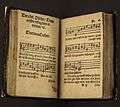Catherine Winkworth
| Catherine Winkworth | |
|---|---|
|
| |
| Born |
13 September 1827 London |
| Died |
1 July 1878 (aged 50) Geneva |
| Venerated in | Evangelical Lutheran Church in America, Episcopal Church USA |
| Feast |
1 July (Lutheran) or 7 August (Episcopal) |
Catherine Winkworth (13 September 1827 – 1 July 1878) was an English-language translator from London. She is best known for bringing the German chorale tradition to English speakers with her numerous translations of church hymns. She also worked for wider educational opportunities for girls. It appears that she coined a once well-known pun, peccavi, "I have Sindh".
Early life
Catherine Winkworth was born on 13 September 1837 at 20 Ely Place, Holborn[1] on the edge of the City of London. She was the fourth daughter of Henry Winkworth, a silk merchant. In 1829, her family moved to Manchester where her father had a silk mill. Winkworth lived most of her early life in this great city, engine of the Industrial Revolution. Winkworth studied under the Rev. William Gaskell, minister of Cross Street Chapel, and with Dr. James Martineau, both of them eminent British Unitarians. Urban historian Harold L. Platt notes that in the Victorian period "The importance of membership in this Unitarian congregation cannot be overstated: as the fountainhead of Manchester Liberalism it exerted tremendous influence on the city and the nation for a generation."[2]
She subsequently moved with the family to Clifton, near Bristol. Her sister Susanna Winkworth (1820–1884) was also a translator, mainly of German devotional works.
Chorale tradition
Catherine Winkworth spent a year in Dresden, during which time she took an interest in German hymnody. Around 1854, she published her book Lyra Germanica, a collection of German hymns which she had chosen and translated into English. A further collection followed in 1858. During 1863, she published The Chorale Book for England, which was coedited by the composers William Sterndale Bennett and Otto Goldschmidt. In 1869 she followed this with Christian Singers of Germany.
According to The Harvard University Hymn Book, Winkworth "did more than any other single individual to make the rich heritage of German hymnody available to the English-speaking world."[3] Four examples of translations by her hand are published in The Church Hymn Book 1872 (Nos 344, 431, 664 and 807).[4]
Women's education
Winkworth was also involved deeply in promoting women's rights, as the secretary of the Clifton Association for Higher Education for Women, and a supporter of the Clifton High School for Girls, where a school house is named after her,[5] and a member of the Cheltenham Ladies' College. She was likewise governor of the Red Maids' School in Westbury-on-Trym in the city of Bristol.[6]
Winkworth translated biographies of two founders of sisterhoods for the poor and the sick: Life of Pastor Fliedner, 1861, and Life of Amelia Sieveking, 1863.
Peccavi

According to the Encyclopedia of Britain by Bamber Gascoigne (1993),[7] it was Catherine Winkworth who, learning of General Charles James Napier's ruthless and unauthorised, but successful campaign to conquer the Indian province of Sindh, "remarked to her teacher that Napier's despatch to the governor-general of India, after capturing Sindh, should have been Peccavi (Latin for 'I have sinned': a pun on 'I have Sindh'). She sent her joke to the new humorous magazine Punch, which printed it on 18 May 1844. She was then sixteen years old.
The Oxford Dictionary of Quotations attributes this to Winkworth, noting that it was attributed to her in Notes and Queries in May 1954.[8]
The pun has usually been credited to Napier.[9] The rumour's persistence over the decades led to investigations in Calcutta archives, as well as comments by William Lee-Warner in 1917 and Lord Zetland, Secretary for India, in 1936.[10]
Hymn books
- Lyra Germanica, Hymns for the Sundays and chief festivals of the Christian Year, Translated from the German, 1855 edition compiled by Catherine Winkworth
- The Chorale Book for England: A Complete Hymn-book for Public and Private Worship Catherine Winkworth, William Sterndale Bennett and Otto Goldschmidt (1863)
- Lyra Germanica: the Christian life, Catherine Winkworth (1868)
- Christian Singers of Germany Catherine Winkworth (1869)
- Songs for the household: Sacred poetry Catherine Winkworth (1882)
Death
Catherine Winkworth died suddenly of heart disease near Geneva on 1 July 1878 and was buried in Monnetier, in Upper Savoy. A monument to her memory was erected in Bristol Cathedral. She is commemorated as a hymn writer with John Mason Neale on the liturgical calendar of the Episcopal Church (USA) on 7 August and on the Calendar of Saints of the Evangelical Lutheran Church in America on 1 July.[11]
References
- ↑ "Catherine Winkworth", CyberHymnal
- ↑ Platt, Harold L. (2005). Shock Cities: The Environmental Transformation and Reform of Manchester and Chicago. University of Chicago Press. p. 64. ISBN 9780226670768.
- ↑ The Harvard University Hymn Book. Harvard University. p. 288.
- ↑ "Catherine Winkworth", (Center for Church Music)
- ↑ Susan Drain: Winkworth, Catherine (1827–1878). Oxford Dictionary of National Biography (Oxford: Oxford University Press, September 2004). Retrieved 13 September 2010. Subscription required.
- ↑ Catherine and Susanna Winkworth (Eclectic Ethereal Encyclopedia)
- ↑ http://www.historyworld.net/Articles/PlainTextArticles.asp?aid=zah&pid=937
- ↑ Elizabeth, Knowles, ed. (2014). Oxford Dictionary of Quotations. (Eighth ed.). Oxford Univ Pr. p. 831. ISBN 9780199668700.
- ↑ Byrne, Eugene. "Sir Charles Napier's sin", BBC HistoryExtra, 9 March 2012
- ↑ "PECCAVI": A Good Story Killed, The Manchester Guardian, 14 February 1936.
- ↑ Catherine Winkworth, Hymnwriter and Educator (Biographical Sketches of Memorable Christians of the Past) http://justus.anglican.org/resources/bio/197.html
Further reading
- The Church Hymn Book ( ed. Edwin F. Hatfield. New York and Chicago: 1872)
External links
| Wikisource has original works written by or about: Catherine Winkworth |
- Collection of hymns translated by Winkworth (The Cyber Hymnal)
- Biographies and published works (Christian Classics Ethereal Library)
